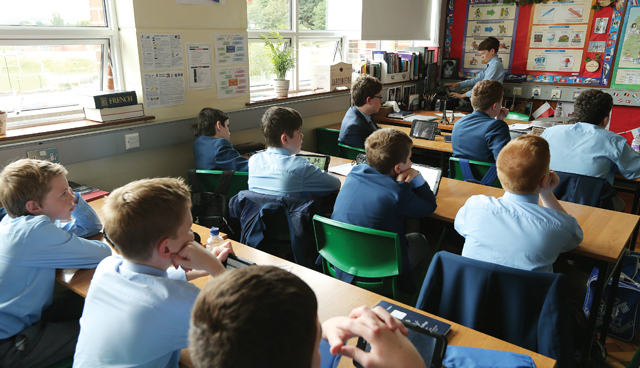Schooling neglect

With some schools choosing to temporarily move away from academic selection in response to the pandemic, an opportunity exists to abolish the practice entirely, writes the ICTU’s John O’Farrell.
Every five years or so, this column gets on its high horse about academic selection. What has prompted this return to the subject is the image of teenagers from Protestant working areas being scooped for attacking police and torching a double-decker bus, and the imminent release of a report by an ‘expert panel to examine the links between educational underachievement and social disadvantage’.
The panel was established under New Decade, New Approach and is approximately the sixth such panel established since the Belfast Agreement. Speaking in the Assembly, the Education Minister Peter Weir said: “I have been involved in the issue of educational underachievement, in particular for Protestant boys in receipt of free schools’ meals, since 2012. I have been passionate about addressing this persistent problem ever since.”
Back in 2012, the then Education Minister John O’Dowd was challenged by DUP MLA Paul Frew on “how he plans to increase the number of working-class Protestants who can go on to participate in higher education”. After reciting the familiar grim statistics about the declining chances of reaching third level for (1) Protestant (2) boys on (3) free school meals at (4) non-grammar schools, then explaining what new departmental initiatives are underway, the Sinn Féin Minister raised the stakes:
“There is also an important role to be played by unionist political leaders in raising educational awareness and aspiration in socially deprived communities. Continued academic selection in the interests of selective schools does not benefit the education or the needs of Protestant pupils from deprived backgrounds.”
A more recent report from the UNESCO Centre of Education at Ulster University found “little evidence that social mobility is increased by academic selection” and that “the current arrangements for school transfer at age 11 contribute to the social and financial costs of a stressful process that serves to benefit a few (generally already privileged with access to tutoring) pupils, while damaging the life-chances of a large proportion of the school population”.
The paper adds to O’Dowd’s direct critique of politicians unwilling to change the system: “It is hard to escape the observation that many of the political class responsible for making decisions on the future of selection, will themselves be the products of the same grammar school system that they seek to defend, and their children in all likelihood also attend such schools.” Peter Weir went to Bangor Grammar.
While it is unfair to criticise children for their parents’ choices for their schooling, there ought to be an expectation of some reflection when adults with power confuse their lives with others who were less fortunate. Twenty years ago, when this debate got properly underway, the grammars’ champion was that formidable barrister Robert McCartney QC MP, whose path to greatness took him from the Shankill to Cultra, via Grosvenor Grammar School.
Bob used to argue that anyone could follow his path, and that the 11+ was a ladder and not a barrier. Where Bob’s argument falls down is the brilliance of Bob himself, as anyone who came into his orbit will attest. The fierce drive of his self-belief earned his fortune, but the same confidence that his was the smartest voice in the room delivered him of his reputation as ‘not a team-player’, to put it mildly.
“If we use this viral crisis to persuade those schools which abandoned selection this year to make that permanent, then we are saying that more of us are in it together, and that does not require the wisdom of another ‘expert panel’, but the will to do the decent thing. Abolish academic selection, for good.”
Bob’s nemesis on this matter was another Shankill boy, the late David Ervine, who long despaired of the products of schools along that road. In 2011, in dedication to him from his protégé Dawn Purvis, she led a comprehensive demolition of the theory and practice of grammar schools as any panacea for working class Protestants. Among the conclusions of A Call to Action was this warning:
“High post-16 educational drop-out rates are internationally linked to low-waged economies, where insecure, highly-changeable, unregulated employment predominates. Large swathes of the UK and Northern Ireland economies have been run on a low-skilled equilibrium. The motivation of young people within the education system is inextricably linked with the degree to which the economy can provide work opportunities with attractive remuneration and career prospects in stable companies in well-regulated trades and industries. The dearth of productive opportunities makes the public sector, by default, the career of choice for too many of our most talented people.”
Since then, we have had a decade of austerity and ‘rebalancing’ the economy away from that sanctuary of decent jobs in the public sector. Decent jobs are around in fintech and other graduate-level services and low-paid jobs are plentiful in retail, services, and hospitality, but all are scarred by insecurity. There seems little in the middle. And then we had the pandemic.
There are places in Northern Ireland that need ladders. We have the data and the indexes of multiple deprivation. We know the blackspots like Strabane and the Creggan. We know the ‘problem estates’ around Carrickfergus and Ballymena and west Belfast. We know that we can’t fix every one of these at once, but we can do things which make things better, and that itself ‘sends a message’.
If we use this viral crisis to persuade those schools which abandoned selection this year to make that permanent, then we are saying that more of us are in it together, and that does not require the wisdom of another ‘expert panel’, but the will to do the decent thing. Abolish academic selection, for good.





